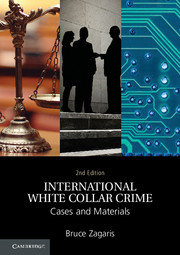Book contents
- Frontmatter
- Contents
- Preface
- 1 Introduction
- 2 Taxation
- 3 Money Laundering and Counterterrrorism Financial Enforcement
- 4 Transnational Corruption
- 5 Transnational Organized Crime
- 6 Export Control and Economic Sanctions
- 7 International Environmental Crimes
- 8 International Securities Enforcement
- 9 Extraterritorial Jurisdiction
- 10 International Evidence Gathering
- 11 Extradition and Alternatives
- 12 International Prisoner Transfer
- 13 The United Nations
- 14 The World Bank Group
- 15 INTERPOL
- 16 Economic Integration and Business Crimes
- Index
- References
4 - Transnational Corruption
Published online by Cambridge University Press: 05 November 2015
- Frontmatter
- Contents
- Preface
- 1 Introduction
- 2 Taxation
- 3 Money Laundering and Counterterrrorism Financial Enforcement
- 4 Transnational Corruption
- 5 Transnational Organized Crime
- 6 Export Control and Economic Sanctions
- 7 International Environmental Crimes
- 8 International Securities Enforcement
- 9 Extraterritorial Jurisdiction
- 10 International Evidence Gathering
- 11 Extradition and Alternatives
- 12 International Prisoner Transfer
- 13 The United Nations
- 14 The World Bank Group
- 15 INTERPOL
- 16 Economic Integration and Business Crimes
- Index
- References
Summary
Introduction
In 1977, Congress enacted the Foreign Corrupt Practices Act (FCPA). For many years, as a result of the FCPA, the United States was the only country with laws actively prohibiting its citizens, nationals, businesses, and, in some circumstances, foreign companies that participate in its capital markets from bribing foreign officials.
Since the passage of the FCPA, a number of international initiatives and conventions have resulted in widespread laws prohibiting bribery and improper inducement of foreign officials in connection with business transactions. Beginning in 1995, several international conventions addressing transnational corruption have entered into force. As a result, the hard law requirements preventing and criminalizing participation in transnational corruption have greatly multiplied. In addition, international organizations and civil society groups have joined to require corporate governance initiatives focusing on antibribery and anticorruption measures.
In recent years, corruption scandals have contributed to the downfall of governments in Ecuador, Brazil, Italy, Trinidad and Tobago, and India. They have weakened long-entrenched ruling parties, including Japan's Liberal Democratic Party and Mexico's Institutional Revolutionary Party. In the United States, two decades after the Watergate scandals prompted new rules concerning political contributions and the enactment of FCPA, campaign finance reform has reemerged as a major political issue.
The number and variety of countries facing corruption scandals highlight the complexity and prominence of corruption as a global issue. Pervasive and uncontrolled corruption thwarts economic development and undermines political legitimacy. Less pervasive corruption results in wasted resources, increased inequity in resource distribution, diminished political competition, and greater distrust of government. Establishing and exploiting opportunities for bribery at high levels of government can also increase the cost of government, distort the allocation of government spending, and dangerously lower the quality of infrastructure. Even relatively petty or routine corruption can deprive a government of revenues, distort economic decision making, and impose negative externalities such as increased pollution on society. Increasingly anticorruption interacts with many other international white collar crime subject areas, such as money laundering, taxation, and organized crime.
- Type
- Chapter
- Information
- International White Collar CrimeCases and Materials, pp. 105 - 167Publisher: Cambridge University PressPrint publication year: 2015
References
- 1
- Cited by



